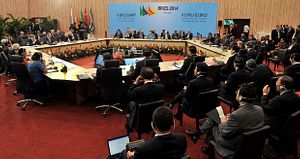The 6th summit of the BRICS (Brazil, Russia, India, China and South Africa) countries in Fortaleza, Brazil is Indian Prime Minister Narendra Modi’s first multilateral summit after taking the reins of the country. As expectations mount, it will be interesting to see which path Modi takes. While this trip will mostly be a continuation of the approach of the previous government, there is hope that India will step up its efforts to give a further boost to its role in multilateral forums.
One important priority at this summit is the starting of the BRICS Development Bank, which will be headquartered in Shanghai. One of the main reasons the inauguration of the bank was given priority at this summit is to reduce the reliance on the existing global financial institutions and create an alternative, as the relationship between some of the member countries and the West has deteriorated. Russia’s actions in its near abroad have rubbed the West the wrong way and resulted in acrimony between the two sides. Many see the BRICS group as a possible alternative for countries should they have a fallout with the West, for the fear of being ostracized.
China also has a complicated relationship with the West. From currency disputes to its actions in the South China Sea, it has had volatile relations with the Western world. While China is praised and viewed favorably for its economic rise, it does not see eye to eye with the West politically, and has often found itself opposed to the West. China’s rise in the region is also viewed with caution by the Western world, which feels that Chinese power does not favor regional stability.
Brazil, which is the most powerful emerging country in Latin America, has also not enjoyed a favorable relationship with the West of late, especially with the U.S. This began with allegations of U.S. spying on President Dilma Rousseff and other Brazilian’s personal communications. This led to the cancelation of her the visit to the U.S. After Dilma and President Barack Obama spoke to each other about the issue, they mutually agreed to postpone the visit to a later date. There was an air of suspicion and hostility between the countries for a period after the episode occurred.
So, where does India fit in, and what does India need to do given the current global situation, in which the Global South and the West have strained relations on many issues? India has also had its share of differences with the West in the recent past, beginning with the Khobragade episode that led to a diplomatic crisis with the U.S., and more recently, allegations of U.S. surveillance of India’s BJP in 2010 under the Foreign Intelligence Surveillance Act (FISA), which at the time was the main opposition party and is now the government. This issue again created unease as to whether it would impact relations between two countries before Modi’s visit to the U.S.
The U.S. Deputy Secretary of State William Burns delivered the formal invitation to Modi to visit the U.S., and the Indian prime minister has accepted. Re-energizing the relationship between both sides has been a top priority for both the Modi and Obama administrations. Both sides have shown their eagerness after Modi was denied entry into the U.S. for almost a decade. Obama took the initiative to call Modi after he won the election and congratulated him. Modi responded by saying the relationship between both countries is more important than personal issues. This pragmatism and maturity from both sides was a positive start toward bringing some new vigor to the relationship.
It would be beneficial for India to focus on its own priorities rather than participating in disagreements between the West and other countries of the Global South. While India shares cultural and economic ties with its neighbors and the larger Global South, it shares many ideological similarities with the West, such as a vibrant democracy, a pluralistic society, and freedom of speech and expression. It also has a sizable trading partnership with the U.S., U.K. and the EU and has improved its relationship with the Western world over the past 20 years.
The way forward for India is to be pragmatic with the West, and at the same time improve its participation in multilateral forums while playing a larger role in global issues. While it is still early days for the new government in India, it has shown signs of pragmatism and continuity in its relations with other nations, which were displayed by previous governments.
Sridhar Ramaswamy is a Master’s student of Indian Foreign Policy with the Jindal School of International Affairs, Sonepat. Tridivesh Singh Maini is associated with The Jindal School of International Affairs, Sonepat.

































